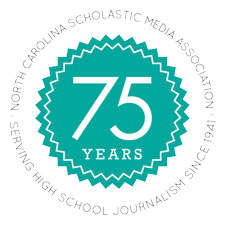Monica Hill
Filmed by Alexis Simmons. Edited by André Rowe, Jr.
Monica Hill is the current director of the N.C. Scholastic Media Association. Hill joined NCSMA in 2002 after six years as a coordinator at the Alabama Scholastic Press Association, based in the University of Alabama. Under her tenure as NCSMA director, the association has launched the Carolina Sports Journalism Camp, sponsored the 2012 Hazelwood Symposium on UNC-Chapel Hill’s campus and has been instrumental in the development of the Chuck Stone Program for Diversity in Education and Media. In this interview, conducted by email with NCSMA Assistant Katie Schanze, Hill discusses the past 15 years as director of NCSMA.
To what do you attribute NCSMA’s longevity?
When I arrived in North Carolina in January of 2002, my first order of business was to host the N.C. Scholastic Media Advisers Association board meeting just three weeks later. The day of the meeting, I was astounded by the arrival of some 20 journalism teachers early on a Saturday morning, ready to begin a day of planning, reflection and work. These teachers/leaders had driven in from mountains and from coast. I attribute NCSMA’s 75 years to the people of North Carolina, who have been devoted to this organization from its start. As the state’s motto declares, these are people who embody what it is to be, rather than to seem. The founders, the directors, the Journalism School deans, all of them have nurtured this association and its mission. They have always believed in its focus on the students and the teachers.
How did your high school experience affect your role as director?
My own scholastic journalism experience is one I treasure and one I want other students to experience. My first “real” byline appeared my fourth-grade year. Language arts teacher Madeline Sellers periodically submitted students’ work to our local newspaper editor. What a thrill to see “By Monica Hill” on newsprint in my hometown weekly newspaper. What a gift Mrs. Sellers gave to me and to my classmates. Our work did not occur in a vacuum. We knew that what we wrote for her, our entire community was likely to read. Scholastic journalists have this great advantage of experiential learning, the great advantage of seeing and living tangible results of their work.
Mine was and is a small town in east-central Alabama. Many of us had never traveled far, but as so many scholastic journalism teachers are apt to do, my high school journalism teacher, Joyce McKinney, offered up the world to us. We traveled to scholastic journalism events and competed in statewide competitions.
What keeps me going in scholastic journalism is my belief in it and my great pleasure to work with the most dedicated, philanthropic educators of any field. I consider it my great privilege to have provided workshop and resource opportunities for scholastic journalism students in two states. And I consider it a great gift to have been afforded the opportunity to watch so many young journalists progress into noted collegiate and professional journalists. Their success stories are testaments to the value of scholastic journalism.
How has your time as director of NCSMA shape your views on student expression?
NCSMA students and teachers continue to support my strong belief in the value of student voices. Through our NCSMA workshops, services and contests, I am constantly reminded of the efficacy of young voices and the intrinsic value in others taking the time to listen, to read, to tweet, to hear. Our communities are strengthened when we allow journalists of all ages to engage in the public conversations.
Please describe the community you found in scholastic media when you were director.
Our state’s scholastic journalism community is one of shared knowledge and long-term commitment. Many of our journalism teachers have remained in the field for decades. The institutional memory that they have allows us to protect the mission of our organization. The commitment they have to the future allows us to face the future with new and exciting endeavors.
Our state association has participated in a national mentoring program, pairing recently retired advisers with those new to the field. North Carolina has had one of the most successful runs with this program. All credit goes to our long-term scholastic journalism leaders who are more than willing to help others. That willingness truly sets our state apart.
Please share your thoughts on the value of scholastic journalism in North Carolina.
Journalism education in our state is one of our finest civics lessons. Our students learn the value of free expression. They learn the value of leadership.
They learn the value of their own opinions. They learn how to evaluate news and information. They learn the value of a vote.
What is your hope for the future of NCSMA?
NCSMA is a vibrant, useful, meaningful organization, and it always has been.
In his archived papers, one of our founders, David Stick, wrote, “In my April 20, 1940, mimeographed form letter to high school editors, I had expressed the hope that the day might come when NCSPI (N.C. Scholastic Press Institute) could be of service to the school papers and editors ‘throughout the year.’”
I hope that decades from now, it will still enjoy the support and respect it deserves from the UNC-Chapel Hill School of Media and Journalism, that it will still seek to help and to serve student voices and that it will still educate and champion scholastic journalism teachers.
Here’s to 75 more years.



